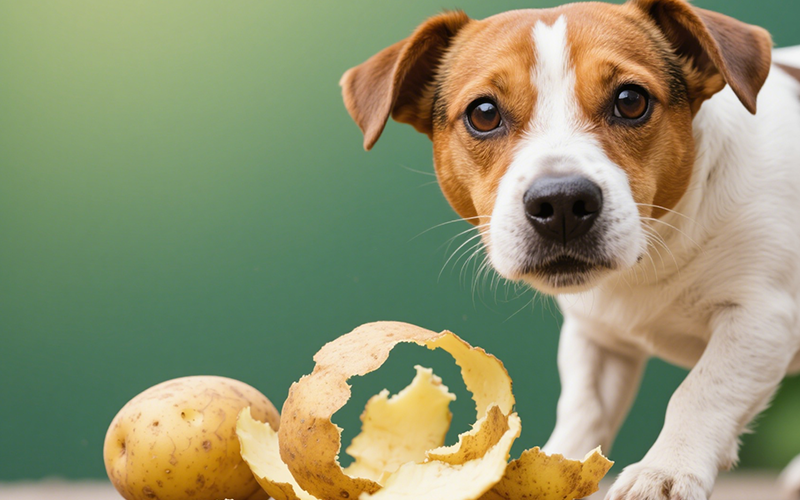Can Dogs Eat Eggshells? A Guide to Feeding Eggshells to Your Dog
- 25 Feb 2025 14:04
Eggshells are something many people may not think twice about when it comes to food, but for pet owners, the question arises: can dogs eat eggshells? The good news is that, yes, eggshells are safe for dogs to eat in moderation and can even provide a number of health benefits. However, just like with any food, there are some important considerations to keep in mind when feeding eggshells to your dog. In this guide, we’ll explore the benefits, risks, and how to safely serve eggshells to your dog.

Health Benefits of Eggshells for Dogs
Rich Source of CalciumEggshells are an excellent source of calcium, which is essential for maintaining strong bones and teeth. Calcium is also important for nerve function, muscle contractions, and proper heart function. If your dog is lacking in calcium, adding crushed eggshells to their diet can help supplement their intake.
Bone Health: For growing puppies, older dogs, or dogs with bone or joint issues, calcium plays a crucial role in maintaining bone density and supporting joint health.
Teeth: Strong teeth are essential for chewing food and maintaining overall dental health. Eggshells provide a natural way to promote healthy teeth in your dog.
Helps with Joint HealthEggshell membranes (the thin layer between the egg white and the shell) contain collagen and other compounds that can help support joint health. Some studies suggest that these compounds can aid in reducing joint pain and stiffness, which is particularly beneficial for dogs with arthritis or other joint problems.
Promotes Healthy Skin and CoatThe calcium in eggshells is also beneficial for promoting healthy skin and a shiny coat. Calcium helps maintain skin integrity and supports the production of collagen, which is a major component of your dog’s skin and coat.
Supports DigestionSome believe that the mineral content in eggshells, including magnesium and trace minerals, can help support healthy digestion. Although research on this benefit is limited, some dogs with sensitive digestive systems may benefit from the added minerals in eggshells.
How to Safely Serve Eggshells to Dogs
While eggshells are beneficial, it’s important to know how to safely incorporate them into your dog’s diet:
Crush the EggshellsBefore feeding eggshells to your dog, crush them into a fine powder. Whole eggshells are too tough for dogs to digest and could pose a choking hazard. Crushing the eggshells ensures they are easier for your dog to eat and absorb the nutrients. You can use a mortar and pestle, a blender, or even a coffee grinder to crush the eggshells into a fine powder.
Start with Small AmountsIntroduce eggshells into your dog’s diet slowly and in small quantities. A small pinch of powdered eggshell can be sprinkled on your dog’s food. For a medium-sized dog, about 1/2 teaspoon per day is a good starting point. Too much calcium can be harmful, so moderation is key.
Use Eggshells as a SupplementEggshells should be used as a supplement to your dog’s regular diet, not as a replacement for balanced nutrition. If you’re already feeding your dog a high-quality dog food, they are likely getting the necessary calcium and other nutrients they need. Eggshells can be a good natural supplement for those with special dietary needs or those who have been diagnosed with calcium deficiencies.
Avoid Seasoned or Cooked EggshellsMake sure the eggshells you feed your dog are unseasoned and uncooked. If you’re using eggshells from cooked eggs, they may have been treated with oils, salt, or other ingredients that are harmful to dogs. Always use raw eggshells, and ensure that they are clean and free of any egg residue.
Monitor for Digestive IssuesWhile eggshells are generally safe, it’s important to keep an eye on your dog for any signs of digestive upset after introducing them. Some dogs may experience mild gas, bloating, or diarrhea if they are not used to the additional calcium. If you notice any of these symptoms, reduce the amount you’re feeding and consult your veterinarian.
Potential Risks of Feeding Eggshells to Dogs
Although eggshells are generally safe for dogs, there are a few risks to be aware of:
Too Much CalciumFeeding your dog too much calcium can lead to calcium toxicity. Symptoms of calcium overdose may include vomiting, constipation, lethargy, and kidney issues. Make sure you’re only adding a small amount of crushed eggshells to their food, and avoid over-supplementing.
Choking HazardIf eggshells are not properly crushed, they can present a choking hazard for dogs, particularly small dogs. It’s essential to crush the eggshells into a fine powder to ensure they are safe for your dog to eat.
Bacterial ContaminationEggshells can sometimes harbor bacteria like Salmonella if they’re not cleaned properly. This is particularly a concern if you’re using raw eggs. Be sure to thoroughly wash the eggshells before crushing them, or you can bake them in the oven at a low temperature (around 250°F for about 10 minutes) to kill any harmful bacteria.
Allergic ReactionsThough rare, some dogs may have allergies or sensitivities to certain foods, including eggshells. If your dog shows any signs of an allergic reaction, such as itching, swelling, or gastrointestinal distress, stop feeding eggshells and consult your veterinarian.
Alternatives to Eggshells for Dogs
If you’re concerned about feeding eggshells or just looking for other ways to boost your dog’s calcium intake, there are a few alternatives you can consider:
Bone Meal: This is a great alternative to eggshells for adding calcium to your dog’s diet. Bone meal is made from ground bones and is available as a supplement.
Fish with Bones: Canned fish like sardines or salmon (packed in water, with bones) can be a great natural source of calcium.
Calcium Supplements: If your dog has specific calcium needs, your veterinarian may recommend a calcium supplement to meet those needs.
Yogurt: Plain Greek yogurt (unsweetened and unflavored) is a good source of calcium and probiotics for dogs, although it should be given in moderation due to its lactose content.
Should You Use PettureX for Your Dog’s Health?
If you’re ever uncertain about what foods are safe for your dog, or if you need advice on whether eggshells or other supplements are appropriate for your pet, PettureX is a great resource. PettureX offers 24/7 online consultations with professionals who can help you determine the best diet and supplements for your dog’s health and well-being.
Conclusion: Can Dogs Eat Eggshells?
In conclusion, eggshells are a safe and natural source of calcium for dogs when served properly. They offer several health benefits, including promoting bone and joint health, supporting digestion, and improving skin and coat condition. However, it’s important to crush the eggshells into a fine powder and feed them in moderation to avoid the risk of choking or calcium overdose.
Always ensure the eggshells are clean and free from any bacteria, and monitor your dog for any signs of digestive upset. If you’re ever unsure about introducing eggshells or any other food to your dog’s diet, PettureX can help provide expert advice and personalized guidance on maintaining your dog’s health.
Related

Radish Bites for Your Buddy? A Vet-Reviewed Guide on Whether Dogs Can Eat Radishes
- 22 Apr 2025
Potato Peels for Pooches? Unpeeling the Risks and Facts for Dog Owners
- 22 Apr 2025
Crunchy Curiosity: Can Dogs Safely Snack on Pork Rinds? A Deep Dive
- 21 Apr 2025
Pomegranate Seeds and Pooches: A Deep Dive into Whether Dogs Can Safely Indulge
- 21 Apr 2025
Can Dogs Eat Peaches? Vet Explains Benefits, Cyanide Risks & Safe Serving
- 16 Apr 2025
Can Dogs Eat Mulberries? Vet Explains Safety, Benefits & Potential Risks
- 16 Apr 2025
Can Dogs Eat Mozzarella? Vet Explains the Cheesy Truth (Risks & Benefits)
- 16 Apr 2025
Can Dogs Eat Mango Skin? Vet Explains Why It's a Risky Chew!
- 16 Apr 2025
Can Dogs Eat Maple Syrup? The Sugary Truth & Why Vets Advise Against It
- 16 Apr 2025
Can Dogs Eat Mac n Cheese? Vet Explains Why This Comfort Food Is Unsafe!
- 16 Apr 2025
